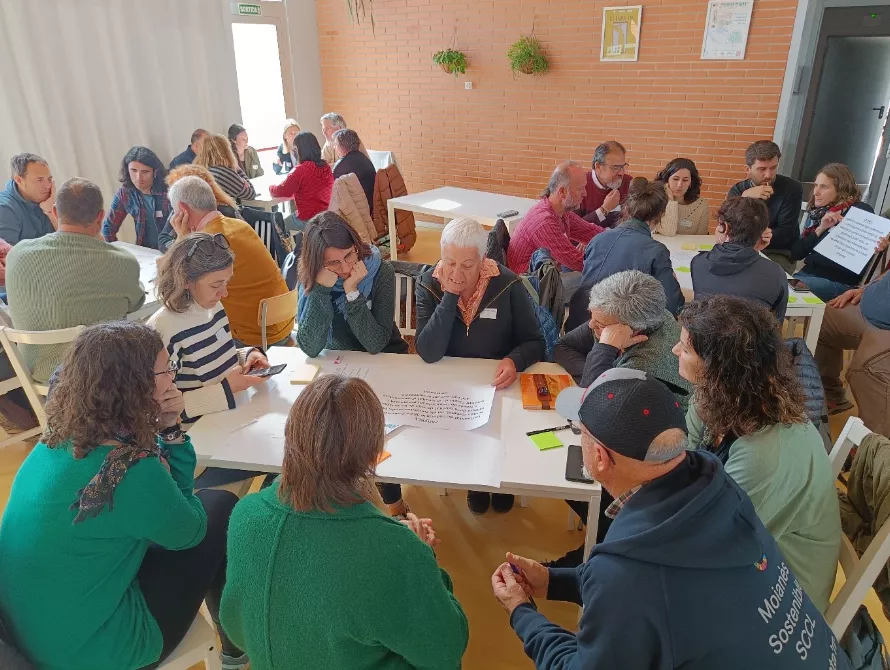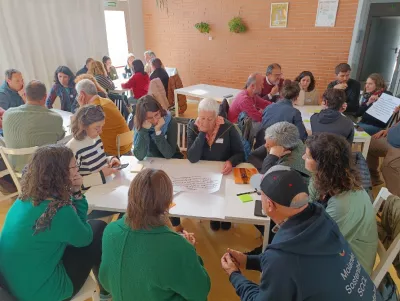Summary
Catalonia set up a joint governance system in 2024 to implement the territorial Rural Agenda and address the needs of rural areas more comprehensively. The main actors involved in the system are: the Regional Government of Catalonia, represented by an interdepartmental commission; the Parliament of Catalonia, with a commission of parliamentarians committed to monitoring the Rural Agenda of Catalonia; and a Steering Committee of the Rural Pact, including 37 representatives of civil society (CSO).
To provide technical support for the development of the Catalan Rural Agenda, this new governance system proposed ARCA, a regional network of LEADER Local Action Groups (LAGs), to oversee and assess the implementation of the Rural Agenda and to develop pilot projects that offer strategic responses to the Agenda.
Results
- The Territorial Coordination Group of the Rural Pact, a coordination body implementing the Rural Pact, is a pilot initiative throughout 2024 with a potential for extension in the event of positive evaluation;
- Bilateral meetings between the Steering Committee representing CSO and the Government address specific rural proofing issues, aiming to adjust administrative processes for rural areas;
- Concrete outcomes of public-private collaboration include the set-up of coordination spaces for housing, mobility, and climate change adaptation;
- The Food Strategic Plan benefits from advisory support to formulating the criteria for grants for shared workshops;
- Coordination efforts are underway for the management of the mobile sheep and goat slaughterhouse;
- A toolbox to implement a 360º education system in rural areas, beyond school time, is being developed;
- Several agricultural test spaces have been launched to explore innovative approaches;
- A pilot initiative, ‘Rural Vouchers’, is expected to stimulate economic activity development in rural regions;
- Approval of the Rural Municipality Statute Law is forthcoming.
Resources
Documents
Context
The Rural Agenda of Catalonia was drafted in 2023. It identifies seven challenges and 275 key priority actions for the socio-economic and cultural development of the rural areas in the region.
A Territorial Coordination Group of the Rural Pact was set up to coordinate the implementation of the Rural Agenda. This coordination body, commissioned by the regional LEADER network ARCA, brings together public and private entities. It works to address the seven key areas of the Rural Agenda: 1) people, well-being and demographic challenge; 2) ecological transition; 3) connected territory; 4) agri-food system; 5) forest system; 6) innovation and economic and social revitalisation; 7) governance.
Objectives
The objectives of the Territorial Coordination Group of the Rural Pact are to:
-
coordinate and animate the triple governance of the regional Rural Pact;
-
support the development of the Rural Agenda, monitor and evaluate its implementation;
-
develop pilot projects to address some of the seven challenges of the Rural Agenda.
Activities, key actors, and timeline
The Territorial Coordination Group of the Rural Pact has established a permanent representation of seven entities to support the coordination and animation of the Rural Pact in Catalonia. This representation includes: the Association of Rural Women; Association of Municipalities of Catalonia; Association of Micro towns of Catalonia; Network of Cooperative Athenaeums of Catalonia; Advisory Council for Sustainable Development; Association of Scouts and Guides of Catalonia; and ARCA.
These entities are responsible for organising, among other actions, the rural proofing work of the Rural Pact.
While this governance system, created in 2023, is led by the regional government – the entity with main competences – three axes (regional government, parliament and CSO) communicate and collaborate to address the rural challenges of the area. This particular model has been developed for the first time in Catalonia, it ensures an equal representation of rural CSO in the process.
ARCA, in collaboration with the 11 Catalan LAGs, has started the development of projects addressing some of the seven challenges outlined in the Rural Agenda. In 2024, the 11 LAGs are working jointly to implement 10 projects. These projects focus on agricultural generational renewal, talent attraction, forest management, energy transition, entrepreneurship, gender perspective, local products, the silver economy, public services, ecotourism, and housing.
Success factors/lessons learnt
-
The most significant lesson learned is that the definition and implementation of a Regional Rural Pact must be developed through a bottom-up approach, despite its complexity, to ensure the involvement of all stakeholders.
-
The set-up of a territorial coordination body for implementing the Rural Agenda of Catalonia marks a significant step towards meeting rural areas’ demand to have a say in decisions on territorial, economic, social, and cultural development.
-
This coordination body has successfully placed the needs of rural territories at the forefront of the government's political agenda, with the Presidency Department, rather than a sectorial department, leading the coordination work on rural proofing.
-
The Rural Agenda participatory process and the governance development are based on the LEADER methodology. This ensures public, private, and community participation throughout implementation processes.
-
This collaborative approach towards rurality is innovative for Catalonia, as it marks the first time that the government, civil society, and parliament work together to address the challenges and needs of rural areas.
-
This model is rare in Europe due to the difficulty of ensuring coordination – it presents an opportunity for transferability to other territories.
Contacts
Eduard Trepat Deltell, coordinator at ARCA: monrural@arca-dr.cat

